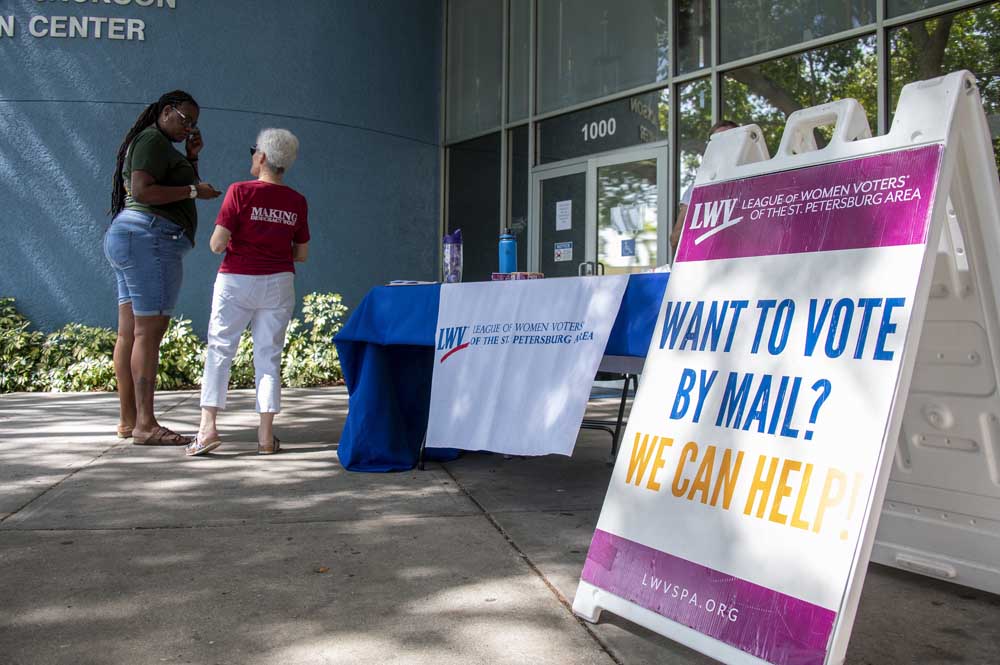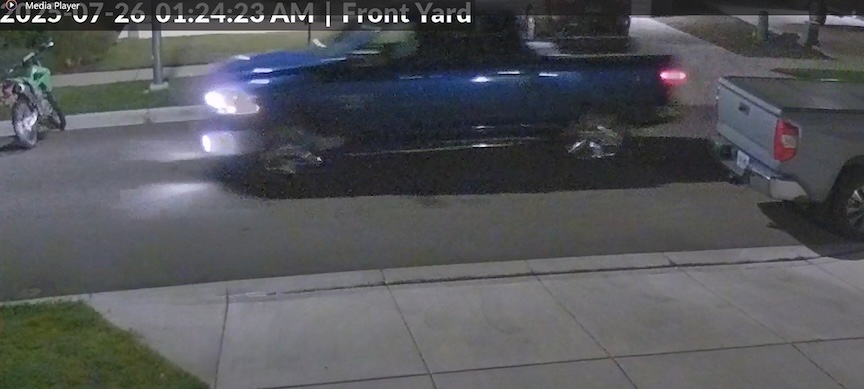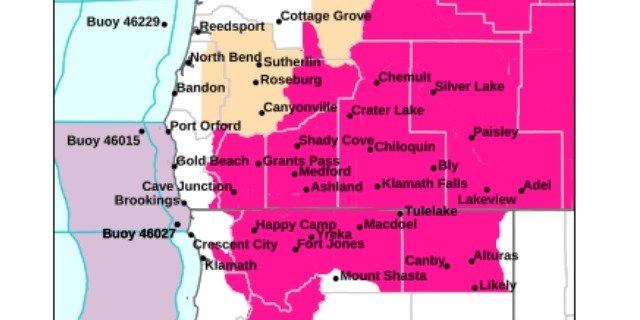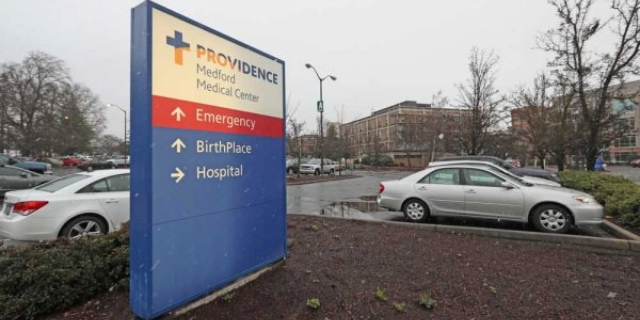Voter registration groups scale back as Florida Republicans tighten rules
Published 9:00 am Sunday, August 4, 2024

- Judy Gallizzi, right, 80, speaks to Tyiesha Watson, left., 34, outside of Thomas "Jet" Jackson Recreation Center in St. Petersburg, Florida, on July 25, 2024. Gallizzi has volunteered with the League of Women Voters for the last seven years and does tabling events often. (Dylan Townsend/Tampa Bay Times/TNS)
TAMPA, Fla. — Ruth Barrens and Judy Gallizzi are veterans in the business of voter registration, eager to chase passersby and ask if they’d like to join Florida’s voter rolls. The pair have long volunteered with the St. Petersburg chapter of the League of Women Voters.
Trending
But their work for the League’s trademark voter registration drives, a mainstay in election-season Florida, looks different this year. The group no longer helps new voters fill out registration forms, opting instead for QR codes that link to the state’s online registration form.
That’s because an omnibus elections bill, signed by Gov. Ron DeSantis last year, imposed strict rules and high fines on voter registration organizations like the League.
Backers say the bill promotes election integrity. But local groups say they feel limited and have registered far fewer voters this year compared with four years ago. They say the law discriminates against Black and Hispanic potential voters.
Trending
“Registering and voting aren’t people’s entire lives,” said Barrens. “It’s not always people’s top priority, and this just makes it harder.”
Barrens and Gallizzi set up a table in the shade outside Thomas “Jet” Jackson Recreation Center in July. They organized flyers and pamphlets with information on voting by mail, ballot amendments and local candidates.
Gallizzi unfurled a roll of stickers with QR codes that link to the state’s online registration website, and Barrens straightened a stack of postage-paid envelopes addressed to the county elections office.
Barrens said the League had to get creative to comply with the elections bill, S.B. 7050, that passed the Republican-controlled legislature last year.
The bill barred people with certain felony convictions from registering voters, shortened the window to submit completed applications, banned pre-filled applications, required that groups re-register with the state each election cycle and mandated that groups provide a receipt for each completed application, among other changes.
Legislators added criminal penalties for breaking certain rules and raised the maximum annual fines from $50,000 to $250,000.
The law also prohibited noncitizens from registering voters, though a federal judge in May blocked that part of the measure after third-party groups sued the state.
“Why are we making it harder for people to vote?” said Maryellen Gordon, co-chair of the voter services committee for the League of Women Voters St. Petersburg chapter. “We’re not saying it should be a free-for-all, but there should not be barriers to that process. It should be easy.”
The legislature has for years backed measures cracking down on third-party voter registration organizations, sometimes referred to as 3PVROs, in hopes of combating election fraud.
State officials say the groups can abuse the registration process by submitting applications with fake names or addresses, or by mining applicants’ personal information. Several states have passed laws similar to Florida’s in recent years, including Alabama, Kansas, Missouri and Tennessee.
Secretary of State Cord Byrd, a close ally of DeSantis, wrote in an April statement to a federal district court: “Third-party voter registration organizations behave badly.”
Byrd cited more than 300 recent allegations of misconduct against the groups, ranging from forged signatures to late applications. Neither Byrd nor DeSantis, who signed the bill last May, responded to requests for comment.
The state’s Office of Election Crimes and Security said it received more than 50 civil complaints from supervisors of elections about late applications from third-party groups, according to its 2023 annual report.
“The trouble with 3PVROs is not new,” the report said. “Issues like this have plagued the state for years.”
But voter registration groups say intentional abuses are rare.
“The entire premise for this voter suppression bill is under the fearmongering of fraud,” said Rep. Anna Eskamani, D-Fla., founder of the voter registration organization People Power for Florida. “It’s one of the most extreme and bureaucratic policies that we’ve seen.”
Fearing lofty fines, many groups now rely on Florida’s online application instead of directly registering people on paper. Groups like the League of Women Voters Florida no longer submit applications on behalf of voters and instead hand out pre-paid envelopes addressed to county elections offices.
“It’s a matter of convenience,” said Christian Hotchkiss, president of the Stonewall Democrats of Pinellas County. Hotchkiss said the group, which targets LGBTQ+ and young people, has been “hands off” this year and has registered fewer voters compared with past election years.
“If somebody is asking if you want to be registered to vote, you expect them to help you,” he said. “When we can’t do that, it creates a barrier.”
Gordon said the changes are seismic.
Online applications are not accessible to all potential voters, she said. Unlike paper applications, the electronic form requires two kinds of identification — a Florida driver’s license or ID card and a Social Security number. Young or unhoused people may not have both, Gordon said. Other new voters, like seniors, may feel uncomfortable sharing their information online.
“It scares people,” she said. “A whole subset of people now have fewer options to register.”
Third-party groups in Florida have registered far fewer voters this election compared with past years.
In 2020, the groups signed up more than 59,800 new voters, according to the Florida Division of Elections. That number dropped to 5,800 in 2023. Halfway through this year, third-party groups have registered 7,000 people.
The trend is much the same locally. In June of 2020, voter registration groups in Hillsborough, Pasco and Pinellas counties sent more than 320 registration applications to the state. This year in June, groups in those counties submitted just twelve applications.
The effect of lower registration falls unevenly, according to research by Daniel A. Smith, a political scientist at the University of Florida. Smith in 2021 filed an expert report for a lawsuit challenging a separate Florida elections law.
Black and Hispanic people in Florida are five times more likely to rely on third-party groups when registering to vote than white individuals, Smith found. Restrictions on the groups decrease the opportunities of “thousands of individuals to register to vote every year,” he wrote, with the burden falling on people of color.
Esther Matthews, president of the St. Petersburg chapter of the NAACP, said the law makes potential voters “question if their vote will count, or if they even have the ability to vote.”
“The clear intent is to limit non-traditional voters from voting,” she said. “It’s an intentional way to discriminate.”
Some local groups are working to educate community members about the changes. Matthews said the NAACP in St. Petersburg will host events to help potential voters navigate the legislation. Common Cause Florida, a civic organization, created a tip sheet.
“These are penalties for community mobilization and helping people engage in the democratic process,” said Amy Keith, executive director of Common Cause Florida. “It’s intimidating.”








